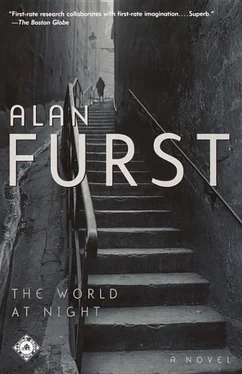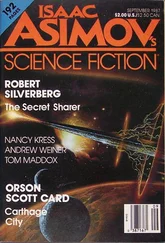Alan Furst - The World at Night
Здесь есть возможность читать онлайн «Alan Furst - The World at Night» весь текст электронной книги совершенно бесплатно (целиком полную версию без сокращений). В некоторых случаях можно слушать аудио, скачать через торрент в формате fb2 и присутствует краткое содержание. Жанр: Шпионский детектив, на английском языке. Описание произведения, (предисловие) а так же отзывы посетителей доступны на портале библиотеки ЛибКат.
- Название:The World at Night
- Автор:
- Жанр:
- Год:неизвестен
- ISBN:нет данных
- Рейтинг книги:5 / 5. Голосов: 1
-
Избранное:Добавить в избранное
- Отзывы:
-
Ваша оценка:
- 100
- 1
- 2
- 3
- 4
- 5
The World at Night: краткое содержание, описание и аннотация
Предлагаем к чтению аннотацию, описание, краткое содержание или предисловие (зависит от того, что написал сам автор книги «The World at Night»). Если вы не нашли необходимую информацию о книге — напишите в комментариях, мы постараемся отыскать её.
The World at Night — читать онлайн бесплатно полную книгу (весь текст) целиком
Ниже представлен текст книги, разбитый по страницам. Система сохранения места последней прочитанной страницы, позволяет с удобством читать онлайн бесплатно книгу «The World at Night», без необходимости каждый раз заново искать на чём Вы остановились. Поставьте закладку, и сможете в любой момент перейти на страницу, на которой закончили чтение.
Интервал:
Закладка:
Strange how life turns, Casson thought. He suddenly felt the ecstasy of the unbound heart. Going to Belgium, to the war. Well then, he’d go. He’d never used the word patriot, but he loved this whore of a France, its narrow lanes, dark and twisted, where you smelled the bread and smelled the piss and bored women leaned on the windowsills- want a ride? The engine of the truck whined, Casson tried a lower gear. But now it grumbled, skipped a heartbeat or two, so he shifted back to the whine.
Rheims.
Again the crowds, and everywhere the tricolor. The women hung garlands on the tanks’ cannon and handed the crews armloads of flowers, cigarettes, candy. Casson had a long pull from a bottle of champagne handed through the window and a wet kiss from a girl who jumped on his running board. A priest stood on the steps of Rheims cathedral and held up a crucifix, blessing the tanks as they rumbled past.
A few blocks ahead, the Peugeot was pulled over and Degrave waved at him to stop. “We’ll want this,” he said. Casson and Meneval loaded one of the cameras, set it up on a tripod on the back of the truck. Degrave took over the driving, Casson worked as the director. They circled around through the backstreets, rejoined the column, filmed the women kissing the tank crews and waving the tricolor. Of the priest, a close-up. Casson banged on the roof of the cab and Degrave stopped. A very French priest-rosy skin, fine hair, a certain refinement in the set of the lips. He held the crucifix with passion. They’d shut up in the boulevard movie theatres when they saw this, Casson thought. It was all well and good to screw the boss and hustle the girls, but they’d all made first communion, and they would all send for the priest when the time came. Cut to the faces of the tank commanders as their machines clanked past. Serious, courageous, going to war. Then a fourteen-year-old girl, tears in her eyes as she ran alongside a tank and handed up a branch of white lilac.
The column left the city on the RN 51. By the side of the road, the stone markers said SEDAN-86. Eighty-six kilometers, Casson thought. From here, you could drive to the border in an hour.
The crowd beside the road through Rethel was nothing like the one in Rheims. This crowd was watchful, and silent, and there were no garlands for the tank guns. After that, the villages were empty. There was no mayor, nobody waving, nobody. They had locked their houses and gone away. When Casson turned off the engine, he could hear the distant rumble of artillery.
On the Route Nationale there were refugees who had come south from Belgium. It looked the same, Casson thought, as the newsreels he’d seen of Poland in September of 1939. Exactly the same. To the question what should be taken? every family had its own answer-the bed, the painting, the clock. But then, days later, it didn’t matter. Exhaustion came, the treasures were too heavy, and into the fields they went.
Rough faces. Flemish, reddened, coarse to French eyes-the thick-handed cousins from the north, pikemen of a hundred armies in wars that lasted a century. The column slowed, then stopped. A nun came to Casson’s truck and asked for water. He gave her what he had, she took it away, shared it out among the refugees sitting by the roadside, then brought back the empty bottle. “God bless you, monsieur,” she said to him.
“Where are you from, sister?”
“The village of Egheze.” Then she leaned closer and whispered, “They burned the abbey to the ground,” her voice shaking with anger while she held his arm in a steel grip. Then she said, “Thank you for your kindness,” and walked away, back to the people by the side of the road.
The column stopped at dusk. From the Ardennes forest, up on the Belgian border, the guns thundered and echoed. The tank crews sat on a stone wall, smoked cigarettes, and drank wine from a brown bottle. There was a reservist with them, a man with a double chin and a hopeful smile. For a long time nobody spoke, they just listened to the artillery. “Well,” the man said, “it seems the Boche have come a long way south.” The tank crewmen grinned and exchanged glances. “He’s worried we won’t win,” one of them said. They all laughed at that. “Well,” said another, “one never knows.” That was even funnier.
After a moment the first one said, “Ah, my little patapouf .” Fatty, he’d called him, but gently, with the tenderness that very hard people sometimes show very soft people. “You have a day or two left to live,” he said. “You better take a little more of this.” He handed over the bottle. The man drank, then wiped his lips with the back of his hand and made an appreciative face to show how good the wine was.
A dispatch rider on a motorcycle picked up the day’s film. Then Casson followed the Peugeot on a steep, narrow road that wound down to the banks of a river. A series of tight curves-it took Casson four moves to maneuver the truck through the final hairpin.
He turned off the ignition, then sat still for a long time. A tiny village, completely deserted, the people fled or sent away. A silent, cobbled street; on one side the river, on the other a few old buildings, crumbling, leaning together, ivy and wild geranium growing up the stone corners and over the tops of the doorways. In the silver moonlight the water and the stone were the same color. A low hill rose above the tile roofs to a wall masked by shrubbery, then Lombardy poplars rustled in the breeze. Then the stars.
Captain Degrave walked over from the Peugeot and appeared at the window of the truck. “There’s a hotel up the street,” he said. “The Hotel Panorama. We were supposed to billet there, but the colonial troops have it.”
Casson had seen them on the road earlier that day; Algerian infantry and Vietnamese machine-gun squads. “I can sleep in the truck,” he said.
“Yes,” Degrave said. “You might as well.”
Casson lay across the seat, listening to the river-the wash of the water moving along the stone embankment-and the cicadas. He turned on his side and fell asleep.
He had a powerful dream, a dream of lost love found again. His heart swelled with happiness. The woman sat across from him-their knees almost touched-and spoke in whispers, as though people were nearby and could hear them.
“That was love,” she explained. “We were in love.”
He agreed, nodded, their eyes met, they longed to hold each other but it was a public place. “We can’t let it go again,” she said.
“No.”
“We can’t.”
He shook his head. If they let it go again it would be gone forever.
He woke up. The guns had stopped, there was just the river and the insects, loud on a summer night.
They worked hard the next day. Degrave started out just as the sun was coming up. They traveled along the river, through a burned village. Casson saw signs in Flemish, so they were actually over the border, in Belgium. They drove for a long time, the roar of the tank engines was deafening, the smell of gasoline and scorched oil hung thick in the morning air. At Degrave’s signal he pulled to one side. Meneval cranked up the camera until the spring was tight, then they filmed the column-tanks coming over a hill, bouncing on their treads in a cloud of dust. They filmed the Algerians on the march, their faces dark and sweating, and the Vietnamese machine gunners, carrying spare barrels and steel boxes of ammunition. Moving up to battle, somewhere in Belgium.
They drove and filmed all day, then stopped in a forest, slept, ate some salted beef and lentils from ration tins. The officers waited for darkness, then ordered the column to move forward. The night was black and very warm. Casson bit his lip as he fought the wheel and shifted gears, dazed from the noise and the heat, close to exhaustion. To his left, on a wooded hillside, a flash lit up a grove of pine trees and the sound of a hollow thump came rolling down the hill, audible above the whine of the engine. What was it? But of course he knew what it was. Fascinated, he stared at the sideview mirror, a small fire flickered at the center of the dark glass, then the road curved and it was gone. Directly ahead of him, the silhouette of a tank’s turret gun traversed back and forth.
Читать дальшеИнтервал:
Закладка:
Похожие книги на «The World at Night»
Представляем Вашему вниманию похожие книги на «The World at Night» списком для выбора. Мы отобрали схожую по названию и смыслу литературу в надежде предоставить читателям больше вариантов отыскать новые, интересные, ещё непрочитанные произведения.
Обсуждение, отзывы о книге «The World at Night» и просто собственные мнения читателей. Оставьте ваши комментарии, напишите, что Вы думаете о произведении, его смысле или главных героях. Укажите что конкретно понравилось, а что нет, и почему Вы так считаете.












